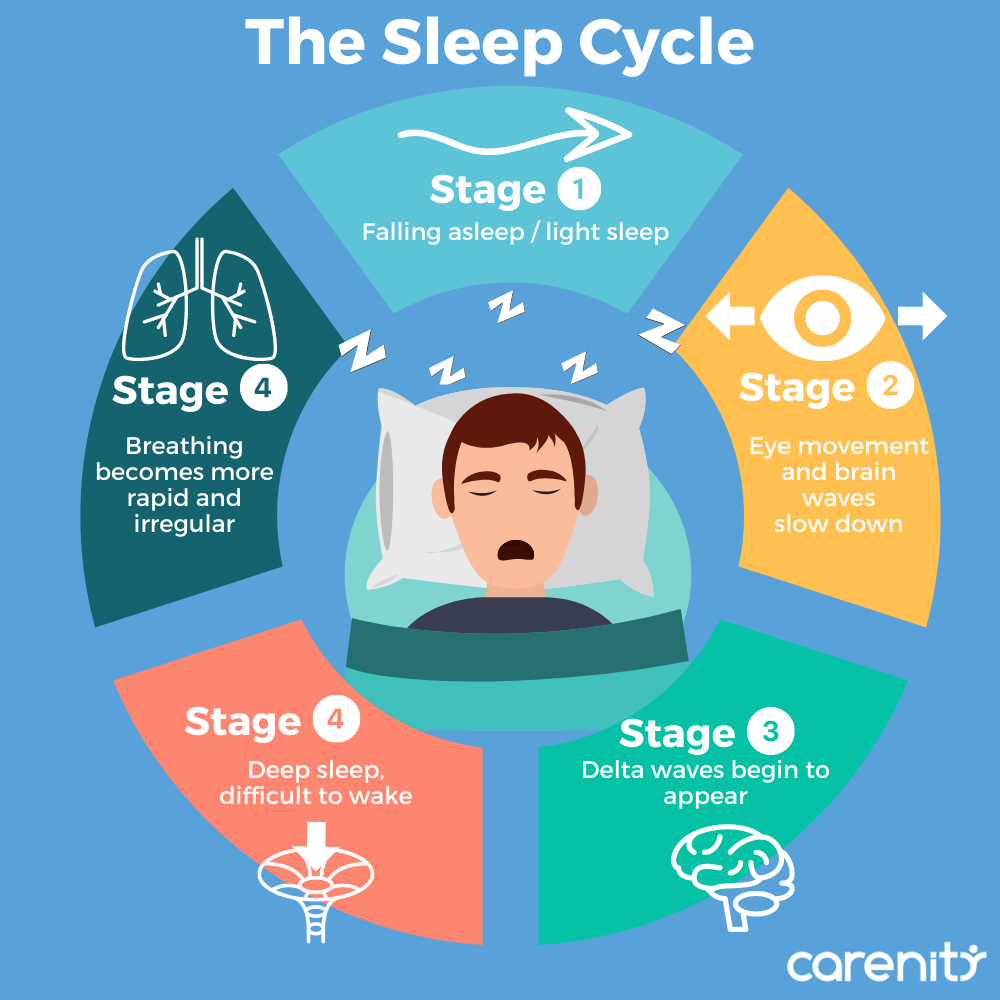What happens to our body when we sleep?
Published 11 Nov 2021 • By Courtney Johnson
Sleep is crucial for our health. In fact, as humans, we spend on average one-quarter to one-third of our lives sleeping.
But what happens exactly when we sleep?
We explain it all in our article below!

How does sleep change throughout the night?
Researchers used to believe that people were both physically and mentally inactive during sleep. Now, with further knowledge, we know that is not the case!
There are four stages of sleep that we cycle through throughout the night. The first three stages make up what is called non-rapid eye movement (REM) sleep, and the fourth is rapid-eye movement (REM) sleep, the stage in which dreams occur.

This cycle occurs multiple times throughout the night and varies in duration, typically from 70 to 120 minutes.
Stage 1: Awake / falling into non-REM light sleep
This phase is the cross-over period from wakefulness to sleep. During this brief period (typically lasting around 7 minutes), we experience very light sleep, the heartbeat, breathing, and eye movements slow, and the muscles relax. Brain waves also begin to slow.
Stage 2: Non-REM light sleep
This stage is a period of light sleep before entering deep sleep. At this point, body temperature drops, eye movements cease, heartbeat and breathing slow even further, and the muscles relax more deeply. Here, brain wave activity briefly spikes and then continues to slow.
We spend most of our sleep cycle in stage 2 sleep.
Stage 3: Non-REM deep sleep
Stage 3 non-REM sleep is the phase that allows us to feel refreshed in the morning. It occurs in longer stretches during the first half of the night. In this phase, heart rate, breathing, and brain activity drop to their lowest levels, and it may be difficult to wake up.
This type of sleep is restorative and is the time when the body repairs tissues, muscles, and cells, and restores its energy.
Stage 4: REM deep sleep
REM sleep first occurs about 90 minutes after falling asleep. During this phase, as its name suggests, the eyes move rapidly behind closed eyelids. In REM sleep, brain activity, breathing, blood pressure, and heart rate increase to near their waking levels.
Most of our dreaming occurs during stage 4, as does the processing of information by the brain, making it an important phase for memory and learning.
What happens to the body and brain while we sleep?
Almost every part of the body undergoes changes during sleep. Once we fall asleep, switching mechanisms in the brain activate, triggering thousands of neurons to go from a waking to sleeping state, which sends signals throughout the body.
While scientists are still unclear about the sleep process and the purpose of sleep, we do know that sleep aids the immune and cardiovascular systems and helps to balance metabolism.
We can observe changes in a number of key bodily processes while we sleep, such as:
Brain function
When measured in a clinical setting, our brain waves demonstrate clear patterns linked to each sleep stage. In early non-REM sleep, brain activity slows; however, in stage 2 and 3, there are brief spikes of brain energy.
In REM sleep, brain activity speeds up and different types of brain waves can be observed, which is why this stage is most associated with dreaming. Scientists think that REM sleep supports critical cognitive functions, such as memory consolidation.
Hormone levels
Both sleep and the circadian rhythm (the body’s internal clock) are a key player in the production of hormones in the body, such as:
- Melatonin, the sleep hormone
- Cortisol, which plays a role in stress response
- Growth hormone, which supports metabolism and bone and muscle development
- Leptin and ghrelin, which regulate appetite
Levels of these hormones fluctuate during the various sleep stages throughout the night, and the quality of a person’s sleep can potentially affect their production during the day.
Muscle tone
As the body goes through each stage of non-REM sleep and the body’s energy expenditure drops, the muscles gradually relax. While in REM, many of the muscle groups experience atonia, a temporary state of paralysis, which keeps the limps from moving in response to the content of our dreams.
The respiratory system and the eyes are unaffected, however, so we continue to breath and our eyes dart back and forth behind closed eyelids, giving us the name for REM sleep.
Dreaming
Dreaming is most common and intense during REM sleep, though it can occur during any other sleep stage. However, dreams that occur during REM and non-REM sleep typically demonstrate different brain wave patterns, with dreams during REM being more immersive, imaginative, or bizarre in content.
Heart rate
Our heart rate starts to slow during stage 1 of sleep and attains its slowest pace at stage 3. However, during REM sleep, our heart rate quickens to nearly the same rate as when we are awake.
Breathing
As with the pulse, breathing also slows during non-REM sleep and reaches its lowest rates during stage 3. It can speed up and become irregular during REM sleep.
Sleep plays a crucial role in our health, giving the brain and body the time to repair and reenergize after a long day.
If we don’t get enough sleep, we may experience certain side effects like mood changes, focus and memory issues, and weakened immunity.
Most adults need around 7-9 hours of sleep, though this can change depending on the person and the phase in life. If you’re having trouble sleeping, make sure to talk to your doctor. He or she may refer you to a sleep specialist or centre, who will be able to identify the underlying cause and help improve your sleep quality.
Was this article helpful to you?
Give it a like and share your thoughts and questions with the community in the comments below!
Take care!

 Facebook
Facebook Twitter
Twitter
